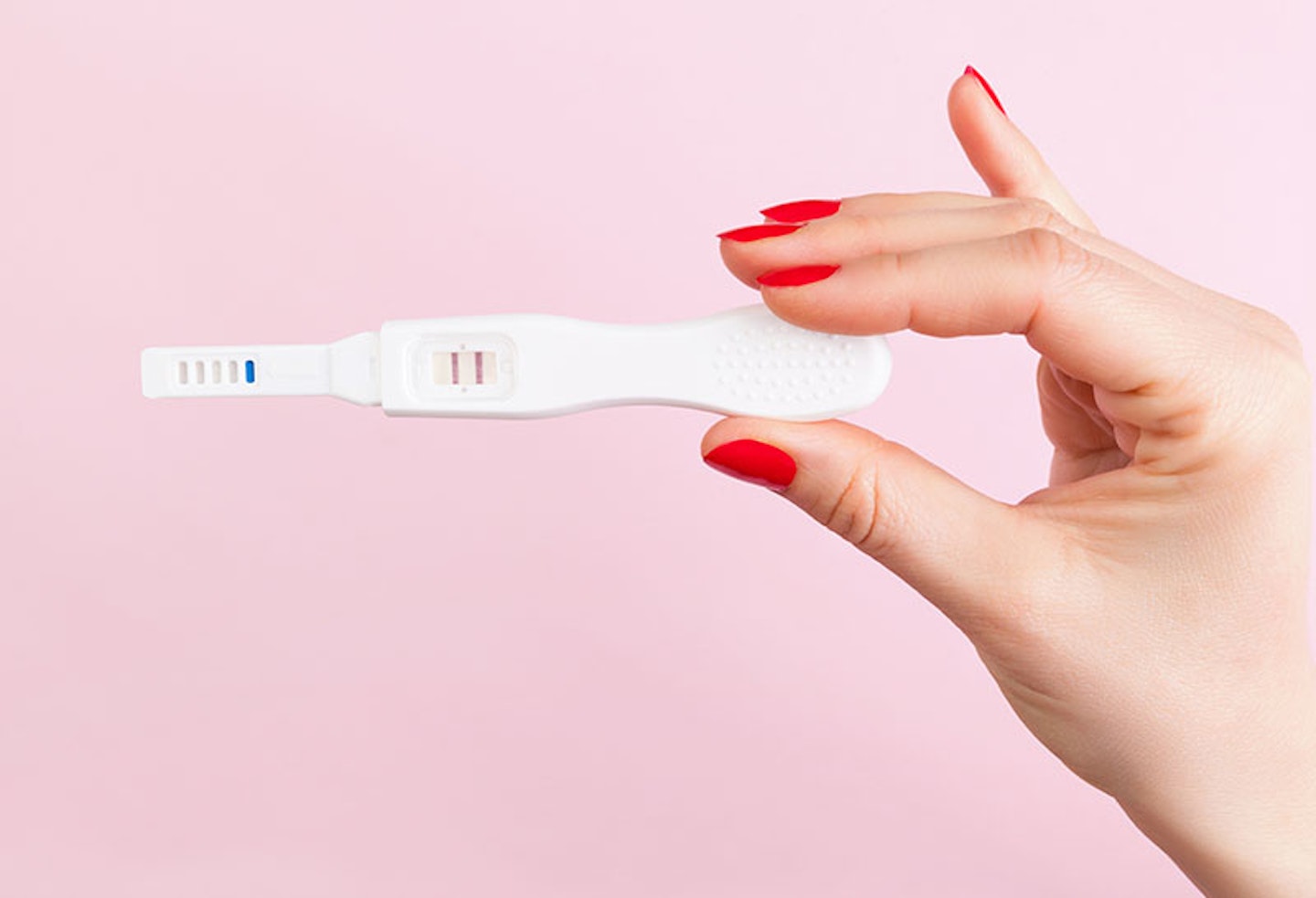Article medically reviewed by midwife Lesley Gilchrist, BSc (Hons) Midwifery Studies, MSc Clinical Research Methods, who is the CEO and founder of My Expert Midwife and has been a midwife since 2003, working in some of the largest teaching hospitals in Europe.
At 4 weeks pregnant, you might start to notice some pregnancy symptoms. Welcome to the beginning of the embryo stage.
It’s now implantation time – the blastocyst will begin burrowing into your uterine lining, before splitting to form the placenta and the embryo.
How many months is 4 weeks pregnant?
When you are 4 weeks pregnant, you are in month 1 of pregnancy, which means you still have 8 months to go.
How big is my baby at four weeks pregnant?
Your baby is still way too teeny to be seen or called a foetus yet and is no longer than 1mm - about the size of a poppy seed.

Do I have a baby bump at 4 weeks pregnant?
Your baby is teeny tiny as shown above, so your baby bump is usually not visible yet as the uterus hasn't expanded enough to push out a little bump. However, you may be finding your body going through some changes as some may experience slight bloating due to hormonal changes, which can make the belly feel a bit fuller. Most baby bumps start to become noticeable between 12 and 16 weeks, depending on body type and whether it’s a first pregnancy.
What is my baby doing at 4 weeks pregnant?
Your soon-to-be-baby has found its new home, where it will now grow for the next eight months. It’s completed the journey from the fallopian tube to your uterus and has inserted itself into the lining of your womb. Some women swear they can feel this happening, and report a cramping sensation, whereas others say they had light spotting, or bleeding in early pregnancy, this is called implantation. As soon as that precious ball of cells has settled into its new home, it will begin splitting in two.
One half is now called the embryo and will become your baby, the other half will become the placenta, an entire organ that you grow specifically to act as your baby’s lifeline for the next eight months. While the placenta hasn't yet formed, there is a yolk sac which has developed and this provides blood and nourishes your baby. Your embryo might be tiny, but it’s busy! This week, the amniotic sac will form around it and there are three distinct layers of cells that will grow into different parts of your baby’s body. The endoderm is the inner layer – think the digestive system, liver, and lungs. The mesoderm is the middle layer and will become your baby’s heart, sex organs, bones, kidneys and muscles. Finally, the ectoderm is the outer layer and this will form your baby’s skin, hair, and eyes.
Your pregnancy symptoms at 4 weeks pregnant
Fatigue
One of the most common symptoms at four weeks is fatigueand exhaustion. Your body is working incredibly hard growing your baby which takes up masses of energy and you have a huge spike in the hormone progesterone which can add to the fatigue.
Mild cramping
Cramping at four weeks is perfectly normal as it means the baby has been implanted properly on the wall of your uterus. However, if the cramping is severe, and/or accompanied by heavy bleeding (some spotting at this time can be very normal), you should contact your doctor and undergo an examination.
Mood Swings
If you are crying at the TV and shouting at inanimate objects, this is totally normal. The changes in your hormones can trigger mood swings. It may be that you are stressed after trying to conceive and you are now worried, or cautious, in the first few weeks of pregnancy. However, pregnancy mood swings will be around for a while, and might get worse at 12 weeks pregnant, after which they should calm down.
Sore breasts
Another common early pregnancy symptom which is caused by hormone surges (hormones, every time!) is sore breasts. Your breasts might be swollen, as well as being tender or sore. Midwife Lesley Gilchrist advises, "you might find a cold compress helps relieve discomfort and paracetamol is perfectly safe to take unless you have an allergy to it. Wear a good well fitting and supportive non-underwired bra (Sports Bras can be very comfortable). "
Bloating
The hormone progesterone may lead to you feeling uncomfortable and bloated. Make sure to wear comfortable trousers, or, even though you don't have a bump yet, maternity leggings are comfortable around a bloated belly, especially as tight clothing can exacerbate bloating. Drink a soothing peppermint tea or pop a hot water bottle on your stomach to help. Lesley says, "try eating smaller meals more regularly, this should help to reduce bloating associated with over-eating but can also help to regulate your blood sugars as well."
Implantation bleeding
If you find you’re having a really light period a week before you’re due or spotting slightly, this could be implantation bleeding. Only a small percentage of women experience an implantation bleed, so do not worry if you don't. Midwife Lesley Gilchrist, explains, "it’s extremely easy to mistake implantation bleeding for an early period as many of the pre-menstrual symptoms, such as cramps, bloating and mood changes are present with pregnancy too. The difference with a period and an implantation bleed is the length of the bleeding, the colour of the blood loss and the heaviness of the blood flow." She continues, reassuring that "implantation bleeding is not a sign that there is anything wrong with the pregnancy and there are no links to implantation bleeding and miscarriage."
Morning sickness
It may be time to experience the thing about pregnancy that you've feared the most, morning sickness. The NHS says that hormone changes in the first 12 weeks of pregnancy cause morning sickness. It is often worse at around 9 weeks pregnant. However, during your second trimester it should start to ease off. Lesley says, "midwives now often refer to Nausea and Vomiting of Pregnancy rather than Morning Sickness as the nausea and vomiting can strike morning, noon, and night. It is really important to maintain good levels of hydration so small sips regularly of water, diluted squash or a herbal tea such as peppermint or ginger should stave off some of the symptoms and will reduce the risk of you becoming dehydrated. Some women find it easier to drink ice-cold drinks or even to get their fluids in the form of ice or ice-lollies. If you are struggling to eat, try nibbling on dry crackers or plain biscuits, seeded bread or seeds, nuts or pulses which are high in unrefined carbohydrates and will avoid blood sugar spikes that can increase the symptoms. Avoid carbonated drinks, caffeine, fatty and spicy foods, and refined carbs such as white bread, white rice and pasta, all of which can make the symptoms of nausea and vomiting worse. Eating smaller amounts more regularly, so 6-7 smaller meals rather than the more traditional 3 meals a day, should help to regulate your blood sugars.
In some extreme cases women can experience a severe form of nausea and vomiting in pregnancy known as Hyperemesis Gravidarum (HG) which often needs medical intervention and a brief stay in hospital to rehydrate you with fluids.
Your GP and /or Midwife can organise some medication for you (anti-emetics) which can improve your symptoms, but you may need to trial some or even take a combination to find out what works best for you."

Your body at 4 weeks pregnant
If you are wondering when to take a pregnancy test, then this week a blood pregnancy test would be positive, but a urine pregnancy test might need a few more days to show positive. Within six to twelve days of fertilisation, your body starts releasing hCG – human chorionic gonadotropin. This is the pregnancy hormone that makes that extra line appear on your pregnancy test and it can take over a week for your body to start producing enough pregnancy hormones to be detected. However, if you have missed a period but had a negative test then it is worth doing another test in a week’s time, during week 5 of pregnancy.
That said, your body knows it is pregnant and is getting ready, big time! Some women will be completely oblivious to their growing baby at this stage, others will experience some early pregnancy symptoms such as mood swings, bloating and cramping.
Looking after yourself at 4 weeks pregnant
Follow a healthy lifestyle
The best thing you can do for your body and your baby is to follow a healthy lifestyle. A balanced diet with a variety of foods, full of vegetables and fruit. You should aim to drink 8 large glasses of water (equivalent to 2 litres) daily. Lesley advises, "if you already exercise, then you can continue to do so although you may find that you are more tired than usual, so rest is important. Speak to a Midwife and your gym/class instructor about keeping active during pregnancy as this can help you to have a healthy pregnancy, reduce your risk of certain conditions during pregnancy, help you to cope with the stresses of labour on your body and help your recovery after the birth. If you do not regularly exercise think about some gentle activity 3-5 times a week for approximately 30 minutes a time such as walking, swimming, pregnancy yoga or pilates."
Emotional and mental wellbeing
The NHS advises expectant mums to speak to their midwife or GP if they are feeling worried, unusually anxious or low in mood during early pregnancy. Perhaps you are worried about how to cope, or your have financial stress, or relationship issues. Talking to someone can help and remember that prenatal depression is not uncommon.
Pregnancy vitamins
At 4 weeks pregnant, if you haven't already, you can start to take pregnancy vitamins. These will help you regulate your vitamin and nutrient intake to help have a healthy pregnancy.

Things to do at 4 weeks pregnant
Ask your doctor about a scan
When you know you're pregnant you should contact your GP or local Maternity Antenatal Unit (you can often self-refer online) to organise your booking in appointment which normally happens around 10 weeks pregnant. This will be a chance for them to confirm your pregnancy and schedule an ultrasound scan too. Lesley adds, "ensure you are taking a daily pregnancy dietary supplement that contains 100% RDA of the Folic Acid and Vitamin D as a minimum. You should also be supplementing your diet with the B Vitamins, Vitamin C, and Zinc."
Work out your due date
The NHS advises you can have a go at working out your potential due date with a due date calculator. Although not completely accurate, it will give you a good idea of when you might be able to expect little one, although bear in mind that only 4% of babies are born on their due date.
Does baby have a heart beat at 4 weeks pregnant?
No, not yet. Your baby's heart has started to develop with a little blood vessel that will become the heart and circulatory system, but it won't start beating until week 6 of pregnancy. You can hear baby's heartbeat at your 12 week scan, or even earlier from8 weeks pregnant if you have an early scan.
FAQs
When do I see a doctor at 4 weeks pregnant?
Most midwives and doctors schedule the first prenatal visit around six to eight weeks, but you should have already made contact with your midwife so if you have any concerns (severe cramping or bleeding) don't delay in contacting them.
Can I take a pregnancy test at 4 weeks pregnant?
Yes! A home pregnancy test should detect hCG (pregnancy hormone) in your urine at 4 weeks pregnant. For the most accurate results, test with first-morning wee.
About the expert
Lesley Gilchrist, BSc (Hons) Midwifery Studies, MSc Clinical Research Methods, is the CEO and founder of 'My Expert Midwife' and has been a midwife since 2003, working in some of the largest teaching hospitals in Europe. Through this time, Lesley has gained invaluable experience and insight into maternity care, labour and birth.
About the author
Lorna White is the Products Editor for Mother&Baby. After running the Yours magazine website, specialising in content about caring for kids and grandchildren, Lorna brought her expertise to Mother&Baby in 2020. She has a keen interest in a range of topics from potty training and nutrition to baby names and early development and has a wide range of experienced medical experts and professionals at her fingertips. In her spare time, she enjoys spending time with her two young sisters, dog walking and enjoying the outdoors with her family.
